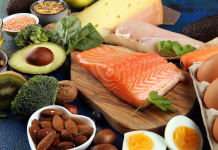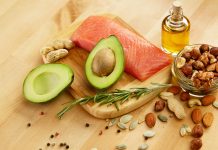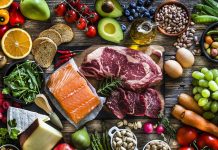With summer around the corner, it’s common for weight loss to creep into our minds.
However, trying to lose weight quickly by following ‘fad’ or ‘crash’ diets, cutting out food groups or trying other extreme methods is likely going to be unsustainable – not to mention unhealthy for your body and mind.
To help guide your weight loss journey, we’ve compiled a list of expert-approved tips to help you slim down the right way.
1. Calculate your BMI
A good starting point is to work out whether you actually need to lose weight. You can use the body mass index (BMI) calculator to find out if you are a healthy weight for your height. It’s advised you also measure your waist to check you’re not carrying too much fat around your stomach, which can increase your risk of disease, type 2 diabetes and strokes.
The NHS advises that if you are classed as ‘underweight’ it could be a sign you’re not eating enough or are ill and should see a GP. If you’re a ‘healthy weight’ you should aim to maintain your weight. If you’re ‘overweight’ the best way to lose weight is with a combination of diet and exercise, and if you’re ‘obese’, you should seek further advice from your GP.
It’s also important to remember there are limitations of the BMI, as it cannot tell the difference between excess fat, muscle or bone.
For example, if you are very muscular you may be classed as ‘overweight’ when your body fat is low, or in fact lead a healthy lifestyle, but are still classed as ‘overweight’ due to other factors. It’s worth figuring out what is right for you before you set out to lose weight.
2. Drink a glass of water
Are you hungry or thirsty? Sometimes people can confuse the two, so you can end up eating more than you need when a glass of water might be all your body is craving at that moment.
Drinking plenty of water is a key part of a balanced diet – it has no calories and contains no sugars that can damage teeth. But, if you’re someone that hates the taste of water, try sparkling water or adding a slice of lemon or lime.
We should drink six to eight cups of fluid a day, with lower fat milk, sugar-free drinks, tea and coffee also counting, as per The Eatwell Guide.
A study in the US of more than 18,300 adults found the majority of people who drank more water (just a small but significant 1% increase) reduced their total daily calorie intake, as well as their consumption of saturated fat, sugar, sodium and cholesterol.
“The impact of plain water intake on diet was similar across race/ethnicity, education and income levels and body weight status,” said paper author University of Illinois kinesiology and community health professor Ruopeng An.
3. Get enough sleep
It seems sleep and weight are more intrinsically linked than we might think. While many of us skimp on sleep to compensate for busy lifestyles, getting the recommended seven-to-nine hours a night (for an adult) is a key component of weight loss.
Research previously published in Nature Communications found sleep deprivation is more likely to make us crave high calorie foods, with tiredness also affecting our brain in a way that prevents us from telling when we’re full. In a nutshell, the less sleep we get, the less likely we are able to make healthy judgments about our diet. But when you get a good night’s sleep, your hunger hormones are more likely to work properly.
“High-calorie foods became significantly more desirable when participants were sleep-deprived. This combination of altered brain activity and decision-making may help explain why people who sleep less also tend to be overweight or obese,” said Matthew Walker, a UC Berkeley professor of psychology and neuroscience and senior author of the study.
4. Don’t skip breakfast
Skipping breakfast won’t help you lose weight. No matter how strapped for time you might be in the morning, it’s worth getting something down you, to avoid missing out on essential nutrients and snacking more throughout the day because you feel hungry.
However, while much research makes the link between skipping breakfast and obesity, including one study that found people who ate breakfast as their largest meal of the day experienced a significant decrease in BMI than those who ate a large lunch or dinner, other research isn’t so sure it makes us healthier.
That’s why enjoying healthy breakfast recipes, rather than cereals high in sugar of fry ups every morning, for example, is also key. Healthy breakfast recipes for all the family could include baked tomatoes or brainy beans on toast, banana and apricot bagels, blueberry and banana smoothies, breakfast burritos, healthy pancakes, scrambled eggs and mushrooms, porridge and more.
5. Load up on fruit, veg and fibre foods
It may be boring, but eating enough fruit and veg isn’t just generally good for us, it’s a key part of losing weight. Fruit and veg are low in calories and fat, but high in fibre, which the NHS describes as the “three essential ingredients for successful weight loss”.
They’re also rich in vitamins and minerals. When trying to load up on your five a day, remember they don’t have to be fresh to count and can be part of a meal.
High fibre foods are also generally great for helping to keep you full, with fibre also found in oats, wholegrain bread, brown rice and pasta, beans, peas and lentils.
6. Don’t ban foods
This leads on to the next point, that foods so often villainised like carbs, can be good for us in some forms. While healthy eating is a big part of losing weight, balance really is key. So cutting out certain food groups completely, especially the ones you enjoy, will only make you crave them more and potentially lead to binge eating. When trying to lose weight, as long as you aim to stay within your daily calorie allowance, which the NHS Weight Loss Plan can help set, there’s no reason you can’t treat yourself from time to time.
“Diets that involve removing – or severely limiting – specific foods or food groups that are nutritionally important are not going to be a long-term solution,” Victoria Taylor, senior dietitian at the British Heart Foundation, told BBC Good Food.
“While any weight loss will require a change to eating habits, it shouldn’t mean missing out on nutrients or cutting out whole food groups. Aim for regular meals and a balanced diet but also take care with your portion sizes. You might be eating a healthy balance of foods, just too much of it.”
7. Eat with smaller plates
This one might sound a little strange, but using small plates and bowels can help you gradually adjust to eating smaller portions, without getting hungry. It takes about 20 minutes for the stomach to tell the brain it’s full, so you can see where the disconnect can happen with not knowing when we’re satisfied. Slower eating can also help with this.
Previous research published in the Journal of the Association for Consumer Research examined 56 studies already done on using smaller plates when eating. The study found that, overall, halving the plate size led to a 30% reduction in the amount of food consumed on average.
8. Do the exercise you enjoy
The most effective ways to lose weight include incorporating exercise and nutrition together, as being more active can help you burn off the calories you can’t with diet.
In terms of which exercise to do, Matthew Hirst, personal trainer at Powfitness previously told Yahoo Life UK, that when trying to get rid of belly fat, the types of exercise you do must be enjoyable.
“HiiT, intervals, cardio training, power training, dancing – there are many types of exercise but the one you enjoy the most is the one you will keep doing.” Cardio can be great for losing calories, but lifting weights can be great for metabolism and building muscle – it’s up to you!
And of course, as well as helping with weight loss, exercise will help with your mental health.
9. Work out in the morning
Studies have suggested morning workouts can particularly aid weight loss. So, unless you have health conditions, preferences, goals, or schedules that don’t align with that, it’s worth considering setting that alarm a little early.
While working out at any time is great for losing weight, a workout first thing has been shown to help with curbing cravings and leading you to make healthier food choices throughout the day, preventing overeating. Plus, when you work out on an empty stomach, you use up more energy from your fat stores.
One study found 45 minutes of physical activity in the morning not only produced lower brain responses to images of food, but also resulted in an increase of physical activity that day, regardless of BMI. Plus, the participants didn’t eat more food in the rest of the day to ‘make up’ for the extra calories they burned, compared with a non-exercise day.
10. Cut down on alcohol
With warmer weather around the corner, the urge for more frequent drinks is expected. But, unfortunately, a normal glass of wine can contain as many calories as a piece of chocolate and a pint of lager has roughly the same as a packet of crisps. Regularly drinking more than the recommended amount – not more than 14 units a week – can cause weight gain, as well as health problems.
This doesn’t mean you can’t have a drink, but try to drink less, and wisely. The NHS tips to avoid weight gain when drinking include:
Alternating an alcohol drink with a glass of water to prevent dehydration
Not drinking on an empty stomach, and choosing healthy options if you need a snack
Avoiding drinking in rounds so you can drink at your own pace
Try cutting down with a friend for moral support
Eating a healthy dinner before drinking to prevent reaching for unhealthy options later in the evening
Taking small sips
Don’t save up your units – avoid binge drinking
Add touches like soda water to your wine to help units last longer


























